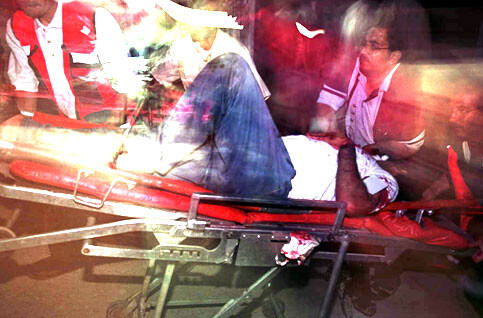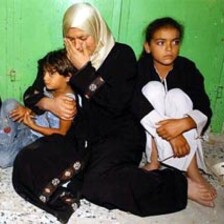Rafah, Gaza Strip 19 June 2003

An injured Palestinian is rushed into Rafah’s hospital. (Ronald de Hommel)
Rafah, you are going to break my heart. People coming, people leaving, bleary eyed ghosts.
The football moon illuminates the soft city full of soft people laying down to dreams unraveling in their hands. Even the concrete fades into sand. Even the refuse, covered with sand, catches fire in the night. The dreams of waste are heavenbound.
“I am a terrorist, Palestinian, Muslim.” Mohammed holds his face in his hands, tissues full of more and more dreams wadded up in forgotten corners.
“Don’t leave. Here forever.”
“I told my father when he took the money from UNRWA, don’t make the house here in Yibneh, make the house in Gaza. He said no, we want to stay here forever. Now where is the money? I don’t know, finished. I don’t know where God is.” The building next to theirs, bombed. Two months ago. Their own family walking up and down ghost stairs in a ghost house that is marked for extinction.
“You smoke too much.”
The 2:30-morning Yibneh streets have no streetlights but the moon. We walk through the stillness of the sleeping souk, metal doors enclose trays of perfume, shoes, scarves, dresses, CDs.
Still we are not the last ones home. Back in the Internet café, men are on the phone to every country for three sheckels an hour all night long. And along the streets, a few stragglers are still hesitating in doorways. Even in the dark they can tell who is foreign. Performers, they come out dancing into the streets to greet us as we walk past, “fadaloo, fadaloo” (“enter, enter”).
Yibneh refugee camp borders Egypt. You find the hard kids here, the ones that still throw stones at foreigners. The ones who play in the roads while a tank parks outside of a mosque at prayer time.
And at 3:30 the muezzin is awake and supplications fold thick around the night. Across the street from our apartment, greenhouses soft in the middle of town, sandwiched between the Cairo Amman Bank and a row of houses.
Never has a city used its land so efficiently, every centimeter is gold, every centimeter is gold. City and farming village collide; the barriers between the city’s past and present are halting, nebulous. A rooster crows all night somewhere between overcrowded concrete homes. Flocks of sheep graze along stretches of highway.
Laura Gordon is a 20-year-old American Jew who came to Israel in December 2002 with the Birthright Israel program and proceeded, three months later, to begin work with the International Solidarity Movement in Rafah. She moved to Rafah two days after Rachel Corrie was killed and has been there since. She works primarily in media work and documentation; and also to liase between the Rafah community and the international community through summer camp projects, cooperative building projects, and English teaching.




